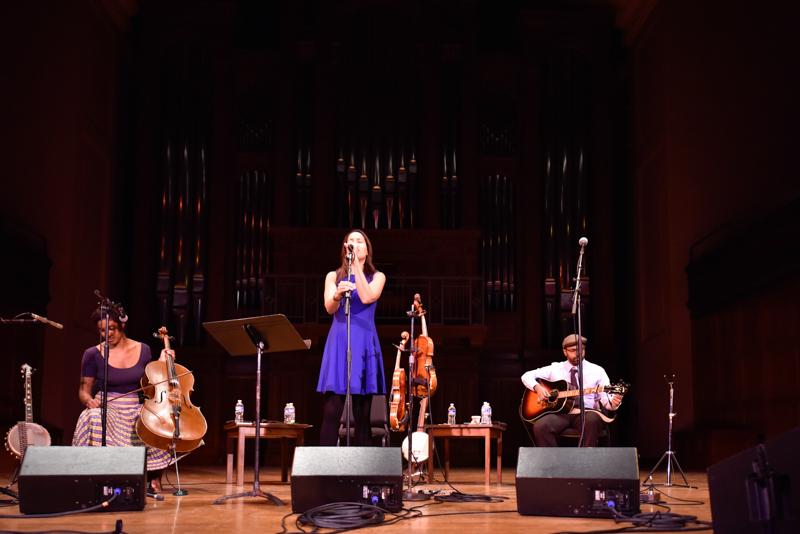‘Swimming in Dark Waters’ Powerful, if Repetitive
From left, Leyla McCalla, Rhiannon Giddens, OC ’00, and Bhi Bhiman collaborate as part of the “Swimming in Dark Waters” tour Saturday night. The show, which touched upon various forms of protest music throughout the evening, was emotionally impactful, if somewhat monotonous.
February 26, 2016
“There’s been a lot of negativity,”Rhiannon Giddens, OC ’00, acknowledged toward the end of her Saturday night set. “But this is Oberlin. We ain’t watering none of this down.”
Giddens and her collaborators — singer-guitarist Bhi Bhiman and singer and multi-instrumentalist Leyla McCalla — didn’t downplay much that evening. For the opening date of their “Swimming in Dark Waters” tour, the trio performed a dour show, telling stories of oppression and grief through multiple incarnations of protest music. Over nearly two hours, they unspooled Civil War-era slave songs, Haitian troubadour shuffles and contemporary satire. The room was left thick with sorrow, the audience witness to a legacy of survival. Yet while the artists’ dedication to their material was evident, their unrelenting gravity stymied their pacing and thinned arrangements to their barest extremes. It all made the night’s impressive stylistic spread feel more repetitive than revelatory.
This kind of project is well within Giddens’ purview. The Carolina Chocolate Drops founder has mixed social justice with American roots music for over a decade, most recently on her excellent solo debut, Tomorrow Is My Turn. Bhiman and McCalla are no strangers to tough talk, either; Bhiman’s songs look at xenophobia with a critical eye, while McCalla’s music draws on her Creole heritage and the poetry of Langston Hughes for a truly multicultural perspective. The three are experts on Black America’s history of coded subversion, which makes them the perfect advocates for forgotten folk songs.
With movements to end racial and gender discrimination now at critical junctures, the relevance of a concert like this can’t be understated. Each musician used that topicality to center their message in context. McCalla’s quiet “Song for a Dark Girl” describes lynchings in graphic detail while renouncing “the white Lord Jesus.” Giddens played “Factory Girl” from her new EP of the same name, a song about New York’s Triangle Shirtwaist Factory fire rewritten for victims of the Rana Plaza collapse in Bangladesh. With his single “Guttersnipe,” Bhiman speaks as one without a home — a person, a people.
Certain songs felt a bit heavy handed. Bhiman’s “Up in Arms,” sung from the perspective of a dying Huey Newton, stumbles with lyrics like, “In ’65 there was a climate for the riots / It’s ’89 and I’m seeing deja vu again.” There was hardly any positivity to be found amid the mourning, which began to numb the senses. Most songs were slow, single-instrument affairs, a respectful yet fatiguing choice that kept any potential groove with both feet on the ground. A cover of the Staples Singers’ “Freedom Highway” — by far the most optimistic and funky selection — practically begged for a rhythm section to back it up. Giddens claimed songs from the high-energy encore “didn’t fit with the rest of the program,” although with one about family and another an instrumental, it was impossible not to wonder why.
Giddens, McCalla and Bhiman’s politically-charged catalogues precede them; the content of “Swimming in Dark Waters” is practically tailormade to their strengths. They owned their music, leaving nothing about their marginalized experiences to the imagination. Yet the sparseness and uniformity of their delivery detracted from their songs’ lyrical impact. A single protester, after all, is infinitely stronger with friends behind them.

























